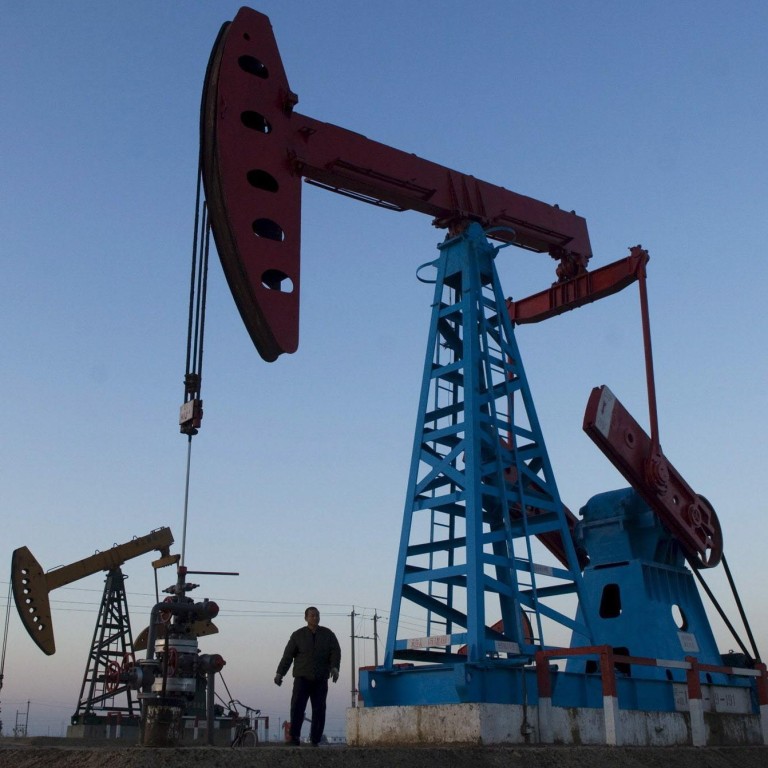
New | China's oilfield services firms grow overseas business while cutting staff to survive another downturn
Analysts caution overseas business in countries that are still expanding oil output tends to come with higher geopolitical risk
China's privately controlled oilfield services firms have been shedding staff much more rapidly than their state-backed peers as they cut costs to survive the worst industry downturn in six years, with both sides seeking to grow overseas business in the face of depressed domestic drilling demand.
But analysts caution that overseas business in countries that are still expanding oil output tends to come with higher geopolitical risk and profit margins, which could hit smaller independent players harder than their larger state-backed rivals.
Anton Oilfield Services (Group), one of China's largest privately controlled drilling services providers, said late last month that its net loss narrowed to 73.79 million yuan in the first half of the year, compared with a loss of 225.6 million yuan in the second half of last year, after it laid off a quarter of its staff in 18 months.
The firm also boosted first-half overseas revenue by 26.5 per cent year on year, mainly from Iraq, while domestic revenue slumped 54.8 per cent.
Its order book swelled to 2.84 billion yuan from 1.82 billion yuan at the end of June last year after it won a US$140 million contract in an Iraqi project by an international oil producer.
Privately controlled Petro-king Oilfield Services, which made a quarter of its staff redundant in the first half of the year, turned in a net profit of HK$8.2 million for the period after booking a loss of HK$431 million in the second half of last year.
Its first-half overseas revenue grew 61 per cent year on year while domestic sales dropped 24 per cent as it doubled revenues from the Middle East and boosted revenues in Kyrgyzstan in Central Asia.
Chief financial officer Lawrence Shu Huadong said Petro-king's gross profit margin in overseas projects ranged from 30 to 50 per cent, compared with 15 to 35 per cent in domestic ones.
[They] are cutting capital expenditure and costs, but not as quickly as they need to
As Chinese state oil firms reduced spending on exploration and resource development and returned jobs previously outsourced to independent services providers to in-house firms, Anton and Petro-king swiftly switched focus to overseas markets, where their cost-competitiveness relative to larger international rivals appeals to oil and gas firms looking for cheaper drilling services.
But some analysts are concerned the strategy will put further strains on stretched balance sheets.
"Independent services companies continue to chase growth, especially overseas, as a means to survive rather than [focusing on] cutting costs," Sanford Bernstein senior analyst Neil Beveridge said. "[They] are cutting capital expenditure and costs, but not as quickly as they need to."
Late last month, ratings agency Fitch downgraded its long-term bond issuer rating on Anton, citing the "tighter liquidity and elevated refinancing risk" revealed in its interim results.
It said Anton's credit risk had increased, with working capital needs remaining high despite a drop in revenue from last year, while its cash balance had fallen and a significant amount of its debt would mature over the next 12 months.
Fitch also noted the higher geopolitical risks in Iraq and Ethiopia, where many of Anton's new orders come from.
Meanwhile, state-owned Sinopec Oilfield Service Corp, whose biggest customer is sister firm China Petroleum & Chemical Corp (Sinopec) - the country's second-largest oil and gas producer - said late last month that it aimed to boost the contribution of overseas business to revenue to 35 per cent by 2020 from 27 per cent in the first half of this year and 20 per cent in the first half of 2013.
Sinopec Oilfield cut 2,700 staff in the first half of the year and plans to shed a further 7,300 in the second half after its first-half net loss widened to 1.25 billion yuan from 455.8 million yuan a year earlier.
But as a state firm, its staff cuts were limited to short-term contract staff and natural attrition of permanent staff as it had an obligation to maintain social stability, company president Zhou Shiliang said. The firm has 81,000 permanent and 38,000 short-term contract staff.
It aims to save 800 million yuan from the staff retrenchment for the whole of this year.
State-backed China Oilfield Services, whose biggest customer is sister firm CNOOC, the country's dominant offshore oil and gas producer, said it had cut more than 200 staff in Norway after a customer cancelled a contract, and shed more than 200 short-term contract staff in China but had not laid off any permanent ones.
With 16,000 staff at the end of last year and a 58 per cent slump in pre-tax underlying net profit year on year, it aims to slash 1.5 billion yuan in costs this year, mainly by cutting material and subcontractor expenses.

